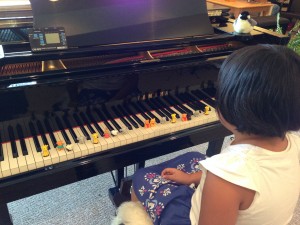During the first couple weeks with a new transfer student, they will often exclaim when I say or demonstrate something, “Wow – I didn’t know that! My old teacher never told me about this.” Or they will say things like,”I have learned more from you in just one month than from my old teacher in a year!”
When I first started teaching, I naturally assumed this happened because I was such a better teacher than their old one. Then one day, a colleague conducted a small masterclass for some of my students and in the process asked my student in what key his piece was. He gave her a blank look and said, ” – I don’t know?”
I almost fell off my chair. Mouth agape, stunned look on my face, I could not believe he did not remember how we had figured out not only in what key his piece was, but also the key relationships from one section to the next. Whenever I quizzed him at his lessons, he knew all of that. And now – suddenly he doesn’t know in what key his piece is?? I was embarrassed and made sure to tell my colleague afterward, privately, that this student DID in fact know the answer. She just chuckled and said, “I know you well enough to know that you wouldn’t teach this piece without going over the key relationships.”
Nice of her, but very eye-opening for me. Now when I get a transfer student who doesn’t “know” something I don’t automatically assume that the previous teacher didn’t teach it.
It also puts in a different light when transfer students gush at how much more they are learning from me than their old teacher: so often it is simply a matter of hearing a new voice, sometimes a different gender, describe or explain something in a new way that makes them pay attention in a way they didn’t with the old teacher. Different environment, different materials perhaps, different vocabulary, and also very simply a bit of adrenaline because everything is so NEW! and not familiar yet.
To parents of teenagers this is nothing new. One of my favorite books as a parent of teenagers was “Get Out of My Life, but First Could You Drive Me & Cheryl to the Mall” by Anthony E. Wolf, Ph.D. In the chapter on “They Don’t Listen to Anything I Say” he imagines the following conversation:
“Eloise, I think it would be a good idea if you dropped Spanish. You’re spending a lot of time on it, and you’re still failing. I’m afraid it’s pulling your other grades down as well.”
“No, Dad, I can handle it. Just leave me alone. You don’t know anything. I’m doing okay.”
“No, Eloise, you’re starting to do badly, and I think the Spanish is just too much.”
“Dad! I can handle it. I’m doing okay. Now leave me alone.”
Two nights later: “Dad, I’ve decided to drop Spanish. I was talking to Becky’s mother about how I was having trouble in school and she said maybe I should drop Spanish. I think she’s right. Besides, I don’t need it anyway, and now I’ll have more time for my other subjects.”
“What did I just say to you two nights ago?”
“I don’t remember.”
…

